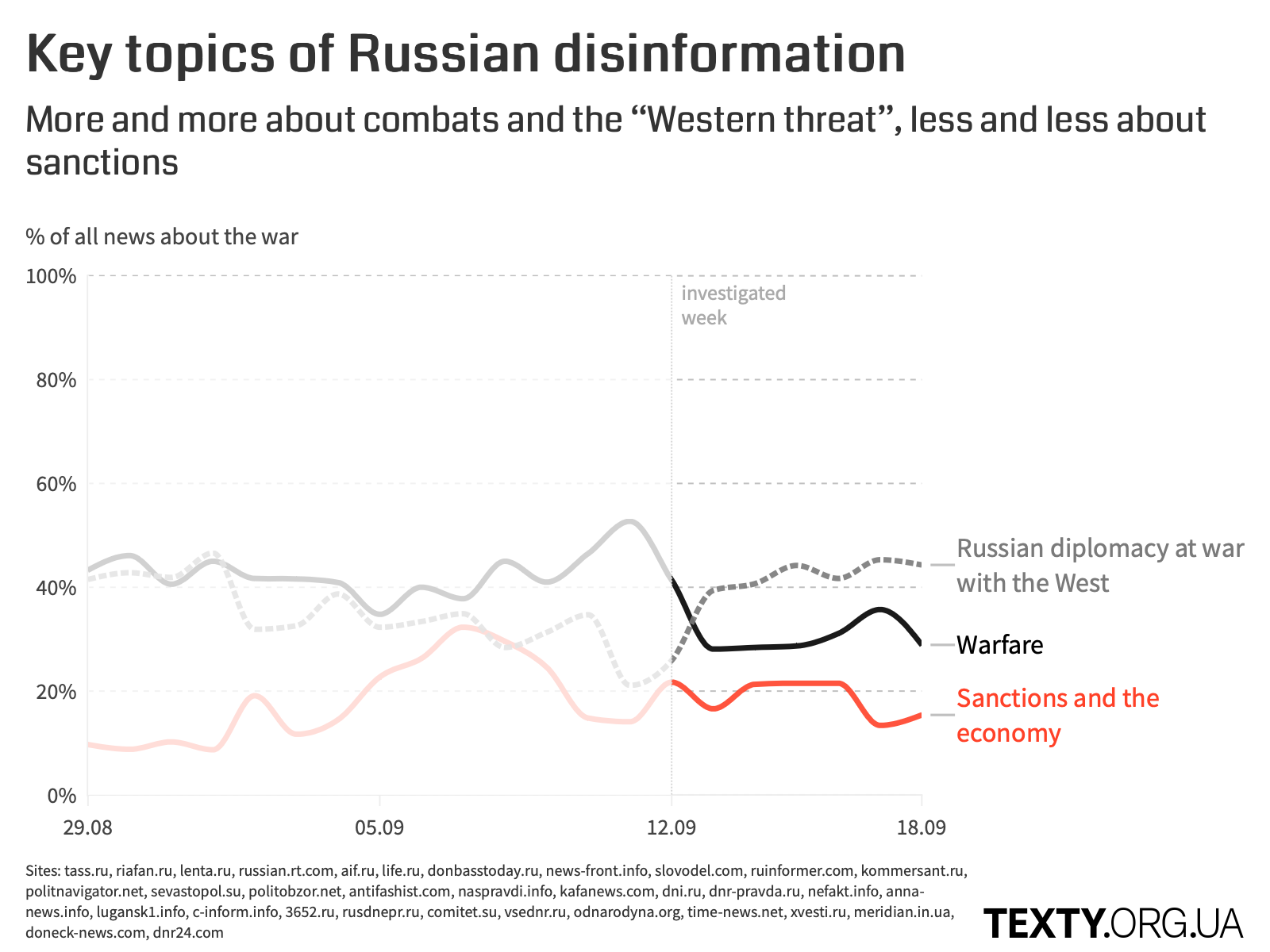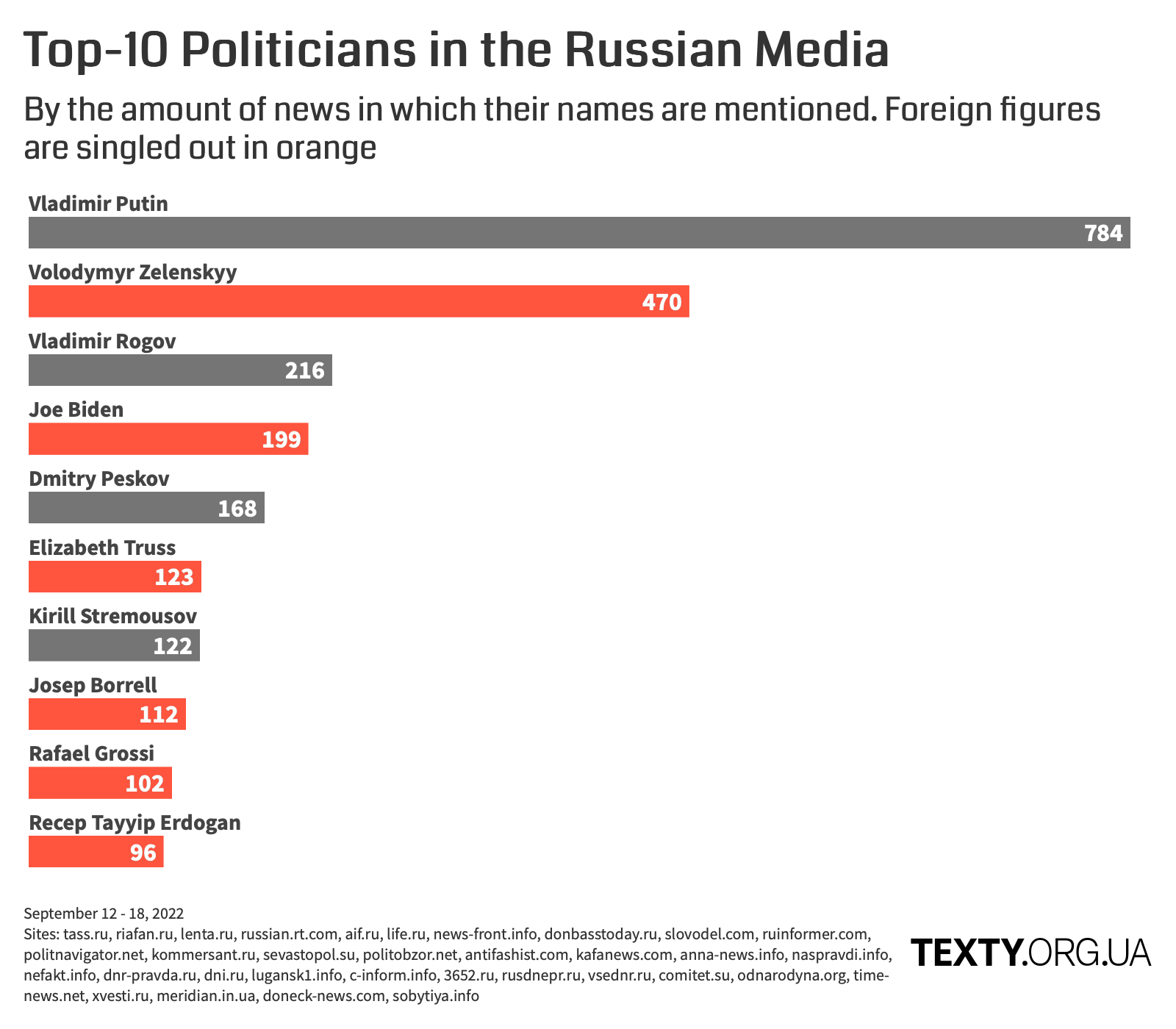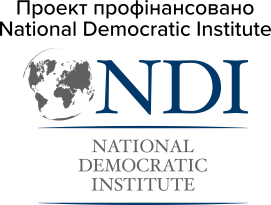Terrorist Ukraine and Back-stabbing Armenia. Russian Media Monitoring Report, 12-18 September
Last week, Russian media launched a dedicated motivation-boosting campaign ahead of the imminent military mobilization. The enemy propagandists fumed over Russia's retreat in Kharkiv oblast and once again justified obliteration of the Ukrainian state. There was also a spike in anti-Armenian propaganda: Armenia was being accused of back-stabbing and fueling a conflict — perhaps, due to Russia's inability to interfere. This monitoring report covers these and other topics of the disinformation spread by Russian state media and online parajournalists to manipulate public opinion.

Selling the Draft to the Masses
The blitz offensive of the Ukrainian forces in Kharkiv oblast caused a sharp decline in the number of publications on war and combat activities in Russian mass media. However, the rhetoric and general tone of the latest publications has become much more menacing and aggressive.
Russian propagandists are continuing to call for strikes on “decision-making centers” and justify the need for decimating the Ukrainian civilian infrastructure: “Doesn't the remaining part of Ukraine which is still resisting liberation have civilian infrastructure? Doesn't it have transmission towers? Last we checked, they still have nuclear power stations, railway hubs, and lots of other infrastructure … Russia ought to direct its firepower on Nazi Ukraine's infrastructure to cripple the Ukrainian state until it collapses. If no such action is taken … don’t be surprised if people start asking why it is still there”.
Enemy observers and commentators pondered over the actual meaning of “regrouping” (the term used to disguise Russian retreat in Kharkiv oblast – editor's note) and the “cunning plan” of the Russian military command. Most of them were openly critical of the intention to reinforce the Russian group in Donetsk oblast by retreating in Kharkiv oblast, and those criticisms aligned perfectly with the calls for general military mobilization: “Mobilizing the people is important, but it is just as important to place Russian economy on war footing”.
To lure the average Ivan into the trenches, Russia propagandist media resorted to the hackneyed narrative about “terrorist Ukraine”: “Time and time again does Ukraine prove to be an epitome of a terrorist state. They have been terrorizing the peaceful people of Donbas for eight years with artillery barrages, acts of intimidation and murders. Acting under the patronage of the USA and the EU, Ukraine continues to pursue its state policy of terror”.
They also intimidated the readers with the spread of hostilities onto the Russian turf: “… today the risk of hostilities spreading onto the sovereign territory of the Russian territory is higher than ever … the AFU are entirely capable of waging a full-fledged low-intensity war in Russian border regions … with the intention of keeping the people who live there and their territory hostage in order to blackmail the government of Russia for political gain”.
They painted “the atrocities of Ukrainian punishers” in shocking detail most likely to encourage general mobilization.
The claims regarding Russia fighting NATO and the USA, not Ukraine have crystallized into a standalone element of exoneration and mobilization propaganda: “the Kharkiv oblast offensive was carried out by a motley crew of NATO forces. Social networks are bursting with video footage of foreign boots on the ground. Americans shoot videos against Izum city welcome sign, a British soldier hiding in the woods demonstrates the stock of his rifle with a bullet hole in it. A black soldier takes a selfie against a howitzer trying to catch the muzzle flash on camera“, “there is undeniable evidence of US military personnel fighting amidst the AFU ranks wearing their uniforms and insignia in plain sight. All these facts speak to the deadly hatred of the Unites States towards our country. The situation is extremely grave: in fact, this is an undeclared war against the Russian Federation!”
Finally, we have noted a surge of undisguised criticisms of the actions of the Russian authorities on propagandist media. Russian pro-war commentators have been bitterly insulted by the lack of consistent communication: “The same mistakes are being made again … As the reputable sources keep silent, people turn to trashy tabloids which whip the readers’ emotions into a frenzy for lack of real facts … the news on our media are full of contradictions which is utter madness … Stringent media control must be part of the SMO — exactly what happened during the anti-terrorist operation in the North Caucasus”.
Armenia is Provoking a Conflict between Russia and Turkey
It seems that the resumption of hostilities between Armenia and Azerbaijan in the first half of September caught Russian propagandists by surprise. They called this latest escalation of the simmering conflict “bizarre and unexpected”. Russian mass media hurried to point fingers: “The two sides of the conflict might come to an agreement on their differences, but there is a bigger problem: Baku and Yerevan are not the only contenders in the region”, “This latest outbreak is part of the implementation of the Pan-Turkist Turkey-Azerbaijan project spearheaded by Turkey which is aimed at securing Turkish domination across the entire domain which they call the Pan-Turkist realm”.
However, it was not only Ankara that was blamed by Russian propagandists for inciting war. Certain Russian political experts alleged that “Western leaders may have their fingers deep in that pie of a conflict”. They reasoned that the collective West is attempting to create diversions by inciting conflicts in a number of other regions”.
Being a CSTO member, Armenia requested Russian military and political assistance claiming that it was in fact Armenian territory that was targeted by artillery, not just Nagorno-Karabakh. This time Russia, which is bogged down in a war with Ukraine, was hesitant.
Most likely it was this ‘tiny’ problem that prompted a flurry of reasons from Russian media as to why Moscow should stand aside from the Armenia-Azerbaijan conflict. The biggest reason was avoiding a direct military conflict with Turkey. Furthermore, the propagandists pointed to the anti-Russian sentiment in Armenia which seems to be swaying towards Europe and NATO: “Granting Armenia’s request for military support would result in an armed conflict with Turkey which has allied with Azerbaijan. If push comes to shove, Armenian anti-Russian sentiment, which has much stronger support unlike the Georgian opposition, might prevail. Armenia has a sizeable diaspora in France, Australia and the USA, and this factor may play a decisive role in changing the country's course towards Europe and NATO following the path of Georgia and Ukraine”.
Russian news writers are openly saying that Yerevan must be prepared to make concessions: “Should Armenia reject Russia’s proposal, in three years’ time Azerbaijan will simply refuse to prolong the three-year ceasefire agreement signed in November 2020. This would end the mandate of the Russian peace-keeping force which would have to withdraw from Nagorno-Karabakh to be immediately occupied by Azerbaijan army”.
And lastly, they came up with a ridiculous claim that Armenia is refusing outside help in resolving its territorial conflicts to pit Russia against Turkey: “Of course, the Armenians do not want any such thing to happen as they are playing their own game by baiting Russia into going to war with Turkey. In their interpretation, this conflict is much larger than Azerbaijan and Armenia contending over Karabakh: they view it as Turkey’s claim for domination in the South Caucasus against Russia“.
Also in the News:
Russian media provided further arguments to support the claim that EU was entirely dependent on the USA: “Unity and consolidation of the EU are things of the past. Today, there is a number of EU subjects who have Washington on speed dial rather than Brussels”, “Europe has in fact surrendered control over many vital decisions including those which define the future of its economy”. They kept saying they were witnessing “a change from federal to imperial policy of the EU”.
Some media convinced the readers that Kazakhstan was in fact a quasi-state: “Following the collapse of the Soviet Union, Kazakhstan started making hectic attempts at building a “national state” just like the majority of other quasi-states which drifted away from historical Russia”. They also called Kazakhstan “a raw-material appendage” and “a convenient springboard for launching anti-Russian […] and anti-Chinese initiatives”. Of course, such rhetoric led to the conclusion that it is only China or Russia that may guarantee the status quo in Kazakhstan: “In all fairness, it is only Russia and China, Kazakhstan's strategic partners, that are able to secure these interests”.

The Methodology
We have built a corpus of all the materials from Russian websites and those maintained by the occupation force (almost 22,000 news items) for our weekly disinformation monitoring report. Each paragraph was processed by the algorithm which defines its topic automatically. The resulting topics (i.e. groups with similar content) were short-listed by the topics relating to the war or its consequences for Russia. The number of mentions of a certain topic was then counted for each publication. Our conclusions are based on the respective findings and the quotes from paragraphs referring to each topic.
We used materials from tass.ru, riafan.ru, lenta.ru, russian.rt.com, aif.ru, life.ru, slovodel.com, news-front.info, kommersant.ru, ruinformer.com, politnavigator.net, donbasstoday.ru, sevastopol.su, politobzor.net, naspravdi.info, antifashist.com, kafanews.com, anna-news.info, lugansk1.info, c-inform.info, dnr-pravda.ru, dni.ru, rusdnepr.ru, 3652.ru, comitet.su, odnarodyna.org, vsednr.ru, time-news.net, xvesti.ru, sobytiya.info, doneck-news.com, meridian.in.ua, dnr24.com


